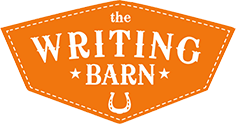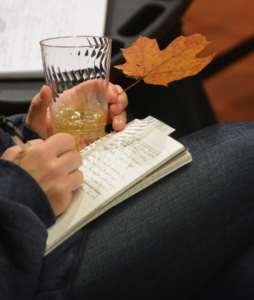The Power of Prompts: Sparking Creativity for Fiction Writing
#WBReflects By Sophie Velasquez
Starting a new story of any length or context can be daunting. As writers, we often start with a single concept or idea that we hope to bring to life through the development of characters, setting, plot, conflict, and so on. We run into so many problems along the way—believability, cohesiveness, and ultimate resolution, just to name a few. But sometimes the problem lies in the foundation of our story, some key element in its skeleton that must be corrected before anything else can work.
If your writing habits are anything like mine, unfinished stories are not uncommon. There’s nothing wrong with
writing, rewriting, and then throwing it all out completely, but this cycle became so prevalent in my writing life that I needed a new creative process. My Fiction Writing Workshop at Saint Edward’s University came at the perfect time, offering countless solutions for lack of inspiration at any point in the writing process. Students begin each class with writing prompts, some more flexible and abstract than others. Some days we are instructed to begin a story in third person objective or in the middle of the climax; other days we have specific words or sentences to start with. The primary purpose of these activities is not to limit our writing options or capabilities but to spark inspiration that may not have been uncovered otherwise.
What makes these prompts so helpful is their ability to become anything the writer chooses. Sometimes, an entire story can emerge from a free-write prompt. Even when this doesn’t happen, though, beautifully crafted phrases or sentences can emerge when there is absolutely no pressure to produce a finish product. Prompts do just what the name implies—they urge the writer to keep going despite any frustration or exhaustion. Writing prompts don’t have to be fiction-specific; you can write poetry, prose, lists, or whatever else comes to mind. The goal is to create unrestricted content without force or expectation.
If you are looking for new methods of writing productively and creatively, I encourage you to keep a daily free-write journal to spark unexpected ideas; so many of my stories never would have been born without this. Even if you only spend ten minutes immersed in writing a day, keeping creativity in your routine can produce new and unexpected ideas. Here are a few examples of free-write fiction prompts to try:
- Create a setting in vivid detail that your character loves. Then, destroy that scene—physically, figuratively, or in another way.
- Begin a scene at the micro level; describe the tiniest details. Make the story come to life on the macro level with big-picture descriptions.
- Find someone to observe. Take in every detail you can about them, list these elements out, and begin an objective story based on what you know.
- Start a story with the opening phrase: “The first time I heard (song) by (artist), I was…”
In all of your writing endeavors, stay persistent and determined. Look for inspiration everywhere!
 Sophie Velasquez is an intern at the Writing Barn, and is studying English Writing and Rhetoric at St. Edward’s University with a specialization in Creative Writing. Originally from Amarillo, Texas, she moved to Austin to thrive off of the artistic energy. Sophie writes and is the Community Health Manager for the St. Edward’s Chapter of the Odyssey, an online publication allowing young writers to share their voice. Of all of her writing, Sophie is most passionate about poetry and creative nonfiction. In the future, she hopes to attend law school as well as share a memoir and other personal narratives.
Sophie Velasquez is an intern at the Writing Barn, and is studying English Writing and Rhetoric at St. Edward’s University with a specialization in Creative Writing. Originally from Amarillo, Texas, she moved to Austin to thrive off of the artistic energy. Sophie writes and is the Community Health Manager for the St. Edward’s Chapter of the Odyssey, an online publication allowing young writers to share their voice. Of all of her writing, Sophie is most passionate about poetry and creative nonfiction. In the future, she hopes to attend law school as well as share a memoir and other personal narratives.


